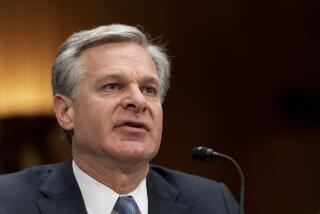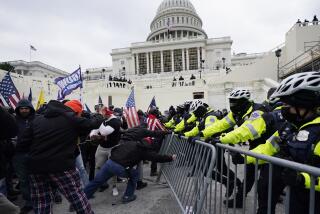Didn’t Think Warning Was Relevant to Confirmation Hearing : Webster Criticized Over Memo on North
- Share via
WASHINGTON — FBI Director William H. Webster, in providing pertinent material to the Senate committee reviewing his nomination to head the CIA, erred in failing to inform the panel of a written warning he received last October about former National Security Council aide Oliver L. North, the committee’s chairman said Thursday.
Nevertheless, Sen. David L. Boren (D-Okla.), joined by the committee’s vice chairman, Sen. William S. Cohen (R-Me.), predicted that Webster will be confirmed by the Senate as the new CIA director. The committee wound up two days of hearings on the nomination Thursday and will vote on Webster after the Senate returns from its Easter recess on April 21.
The committee learned recently from independent counsel Lawrence E. Walsh--not the FBI--about an Oct. 30, 1986, FBI memo that Webster received. The document recommended that the bureau not furnish classified information to North, a key figure in the Iran- contra scandal.
The recommendation had come from a Justice Department official who thought that North might become involved in a criminal investigation of U.S. activities in Central America.
The committee has focused attention on the memo because of concern that the FBI waited too long before becoming involved in the Iran-contra investigation, giving the key figures time to destroy documents and conceal their activities. The memo, portrayed by some as a warning sign, was sent to Webster almost a month before the bureau’s criminal investigation began.
On Thursday, Webster, who said that he did not remember reading the memo, was grilled on why the FBI did not turn it over to the committee for review when it was finally unearthed.
“Had Walsh not sent” the memo to the panel, “would this committee have been apprised by you or the bureau” about the recommendation? Boren asked Webster.
Issue of Aid to Rebels
Webster said that his senior staff had concluded that the memo did not relate to the committee’s question on when he first learned “from sources other than the public media” that U.S. officials were providing illegal support to the Nicaraguan rebels.
Because the Justice Department official’s warning was based on newspaper accounts about North’s activities in Central America, Webster said, his staff concluded that it was “public media” material and thus not of interest.
“I think this was an error,” Boren said. “We were trying to find your state of mind . . . what kind of suspicions you would have” about the Iran-contra matter.
Boren told Webster that the committee was inquiring about the memo to learn “whether you had been suspicious enough” when the FBI director went along with Atty. Gen. Edwin Meese III’s decision not to bring the FBI into the Iran inquiry immediately after he learned of the diversion of funds to the contras last November.
The committee was also concerned about whether the memo should have made Webster more reluctant to agree to Meese’s request that a federal investigation of Southern Air Transport, a small Florida airline that helped supply the contras, be temporarily delayed to avoid jeopardizing the Iran-hostages operation.
Webster said that, although the memo was dated Oct. 30--the same day he agreed to delay the Southern Air Transport inquiry--the memo did not reach his office until Oct. 31. “I give you my solemn pledge that I will not try to be devious or cute with the committee,” Webster said in asserting that he provided all material he believed relevant to his review.
Under pressure from Sen. Arlen Specter (R-Pa.), who emerged during the hearings as the panel’s most insistent questioner, Webster reluctantly agreed to give his view, before the committee votes on his nomination, on whether Deputy CIA Director Robert M. Gates “acted properly” during his committee testimony on the Iran arms deal.
Gates was President Reagan’s first choice to succeed CIA Director William J. Casey, who retired after brain surgery earlier this year. Gates withdrew his nomination after questions arose about his possible role in the Iran inquiry.
Specter contended that the CIA official had a “significant” role in preparing testimony given to investigating committees by Casey that was allegedly incomplete and evasive.
“I just think it would be unfair when two committees of the Congress and the independent counsel” are investigating the case “to come to a hasty rush to judgment on a very senior official,” Webster said.
“I don’t want to, but, if you insist, I’ll look at the testimony,” Webster said.
The committee went into closed session Thursday night to question Webster about classified matters.
More to Read
Get the L.A. Times Politics newsletter
Deeply reported insights into legislation, politics and policy from Sacramento, Washington and beyond. In your inbox twice per week.
You may occasionally receive promotional content from the Los Angeles Times.










